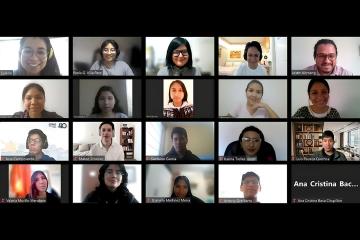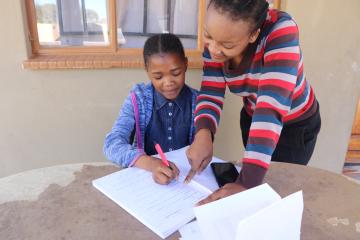
20 for 20: Empowering change in Ghana as an African researcher

This is the third post of J-PAL’s 20 for 20: Partner Voices blog series, where we showcase stories of results and impact with our partners to celebrate our twentieth anniversary. Read on to learn more about J-PAL invited researcher Edward Asiedu's (Senior Lecturer, University of Ghana) experience as a researcher in Ghana and his journey to development economics.
As J-PAL celebrates its 20th anniversary, I am honored to share my experiences as part of the J-PAL network and shed light on the impactful work we have accomplished in Ghana. As a development economist and senior lecturer at the University of Ghana's Business School, my research focuses on designing and evaluating interventions and financial products to reduce poverty and inequality. In this blog post, I will take you through the journey that led me to this field and share the perspective of an African researcher in development economics.
Growing up: The inspiration behind the research
My personal journey in poverty and inequality research began in Ghana, where I witnessed the stark contrast between the rich and the poor in society. Coming from a modest background, I accompanied my mother to the market daily and started questioning the disparities I observed. Why were some people able to afford luxury while others struggled to expand their businesses or make ends meet? These fundamental questions sparked my curiosity and drove me to seek answers. Little did I know that development economics was key to understanding and addressing these issues.
Years later, I discovered the field of development economics and decided to pursue graduate degrees at renowned universities abroad. Upon concluding my doctoral degree abroad, I was at a crossroads wondering if I should remain in North America or Europe, or if I should go back home to Ghana. As an African researcher, the choice to return to Ghana after completing my education was not an easy one. Academic positions in Africa often have heavy teaching loads and limited research support. However, the support I received from J-PAL, both in terms of funding and mentorship, played a vital role in shaping my decision to stay in Africa. J-PAL's initial funding allowed me to combine teaching responsibilities with research fieldwork, enabling me to make a tangible impact while staying in my home country.
Mentorship, collaborations, and influencing policy with evidence
The mentorship from the J-PAL network and senior affiliates, such as Tavneet Suri, Jessica Goldberg, and Chris Udry proved instrumental in my growth as a researcher conducting randomized evaluations. The invaluable guidance and co-authoring opportunities provided by J-PAL not only strengthened my skills but also expanded my network. Through conferences, seminars, and collaborations with both J-PAL affiliates and PhD students in North American universities, I have received constructive feedback on research design and questionnaire development. The robust ecosystem of experts within J-PAL has also been a constant source of support and encouragement.
Presently, as an invited researcher with J-PAL on initiatives like DigiFI and JOI, I have the privilege of using research to inform policy decisions. The increasing momentum of evidence-based policymaking means that there are policymakers who actively seek insights into what works and what doesn't. In Ghana, where high levels of debt demand accountability, it is crucial to ensure that interventions funded by the government have a significant, positive impact on the population. By collaborating with policymakers from the onset, alongside other researchers using randomized evaluations, we are helping bridge the gap between research and implementation while aiming to promote cost-effective solutions and minimize wastage.
Ongoing research and future endeavours
My work with J-PAL has centered on addressing the issues I witness in Ghana daily. For example, one of the projects I am working on focuses on leveraging mobile platforms and national identification systems to encourage savings and provide retirement options for those in the informal labor sector. Through randomized evaluations, we aim to estimate the causal impact of our interventions and design interventions that genuinely improve well-being. However, it is important for newcomers to this to understand that setting up projects, establishing partnerships, securing funding, and conducting pilots require time and dedication. I always encourage aspiring researchers to start with small-scale pilots to ensure the viability of their setups.
My journey as an African researcher within the J-PAL network has been a rewarding experience. The support, mentorship, and funding provided by J-PAL have not only enabled me to conduct rigorous research but also empowered me to influence policies that address poverty and inequality in Ghana. As we move forward, I remain grateful for the opportunities and resources provided by J-PAL and aim to support the scaling of effective interventions that emerge from my research. Additionally, alongside the other University of Ghana researchers affiliated with J-PAL, we are striving to institutionalize workshops on randomized evaluations and engage with young students to foster a new generation of researchers dedicated to evidence-based policy-making in Ghana and beyond. I strongly believe that together, we can continue to empower change and improve lives through impactful research.
To hear more from Edward and other African Scholars, watch the following video:

